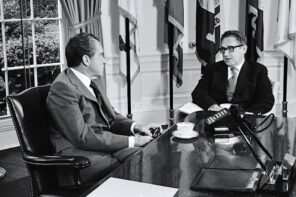For months, the American Israel Public Affairs Committee (AIPAC) anticipated that this year’s annual Washington DC policy conference, slated to kick off Sunday, would focus on US pressure to deter Iran’s nuclear ambitions. But much to AIPAC’s dismay, two recent events threaten to blunt that message, alter the tone and content of the conference and, more broadly, the US-Israel relationship.
One event involves the highly publicized US-Israel disagreement over settlements that simmered to the surface during Vice President Joe Biden’s recent trip to Israel. The other—less publicized but far more consequential—centers on a top military commander’s recognition of the negative impact that Israel’s behavior is having on US credibility in the region.
Each year, thousands of pro-Israel Americans travel from around the country to the Israel lobby’s biggest event of the year to meet, network, and hear speaker after speaker praise Israel and the US-Israel relationship. On the final “lobbying” day of the conference, attendees travel en masse to Capitol Hill to communicate their ideas and concerns to Congress.
The focus of this year’s conference was supposed to be Iran. The threat to Israel’s security posed by Iran has been a central concern of AIPAC for over a decade now, but the last year has seen an unprecedented push by the organization for tougher sanctions on the Islamic Republic. In keeping with its well-deserved reputation for effectiveness, AIPAC successfully helped advance far-reaching economic and energy sanctions bills through both the House and Senate.
In an attempt to move the sanctions bills through reconciliation and onto the president’s desk, earlier this month AIPAC sent a letter to every member of Congress demanding that the US government “impose crippling new sanctions on Iran,” including “provisions barring federal contracts to companies which are investing in Iran’s energy sector.” Increased pressure on Iran was queued up to be the number one issue for the conference, with conferees traveling to the Hill with one message: Raise the pressure on Iran now.
But that message discipline was disrupted just two weeks before the conference. On March 9, shortly after Vice President Joe Biden had arrived in Israel and assured Israeli Prime Minister Binyamin Netanyahu that there was “no space between the United States and Israel when it comes to Israel’s security,” Netanyahu’s government announced plans to build 1,600 new homes in a Jewish settlement in an area it claims around Jerusalem, but which the rest of the world recognizes as the occupied West Bank.
Though Netanyahu claimed to have been blindsided by the announcement, Biden condemned it. Over the course of the week, the disagreement escalated. Secretary of State Hillary Clinton made a 45-minute phone call to Netanyahu. Israeli ambassador Michael Oren, after being summoned to the State Department for a dressing down, reportedly called the dispute a 35-year nadir of the US-Israel relationship. Subsequently, in an attempt to tamp down concerns, Oren took to the op-ed pages of the New York Times to deny that he had engaged in such a characterization, and to minimize the event as a blip on the “unassailably solid” relationship between the two countries.
For such conflict to boil to the surface on the eve of the biggest event on AIPAC’s calendar was disastrous. AIPAC’s stated mission is “to help make Israel more secure by ensuring that American support remains strong.” A crisis like this cuts right to the core of AIPAC’s very purpose.
Clearly recognizing the threat both to its reputation and its goals of stepped-up Iran sanctions, on March 14 AIPAC’s director of media affairs Josh Block issued a strident press release calling on the Obama administration “to take immediate steps to defuse the tension with the Jewish State” (while saying nothing to indicate any displeasure with the Israeli government’s gratuitous insult of the American vice president). Other conservative pro-Israel organizations, both Jewish and Christian, soon followed suit, ignoring (as they always have) the settlements provocation and blaming the American administration for the disagreement. The progressive pro-Israel group J Street was virtually alone in recognizing the crisis as generated by the Israeli government’s provocation with the new settlement construction.
While recent statements from both governments indicate that the crisis may be contained, another looms. On March 13, journalist Mark Perry published a story on Foreign Policy’s website detailing a briefing given by the US Central Command (CENTCOM) to the Chairman of the Joint Chiefs of Staff, Adm. Mike Mullen. According to Perry, “the briefers”—who had been dispatched by CENTCOM commander Gen. David Petraeus—“reported that there was a growing perception among Arab leaders that the United States was incapable of standing up to Israel, that CENTCOM’s mostly Arab constituency was losing faith in American promises, [and] that Israeli intransigence on the Israeli-Palestinian conflict was jeopardizing US standing in the region.”
In testimony (pdf) before the Senate Armed Services committee on March 16, Gen. Petraeus reiterated these concerns. Petraeus, one of the most respected military men in the country, told the committee that the Israel-Palestinian conflict “foments anti-American sentiment, due to a perception of US favoritism for Israel,” and that “Arab anger over the Palestinian question limits the strength and depth of US partnerships with governments and peoples in the AOR [CENTCOM’s Area Of Responsibility, the Middle East] and weakens the legitimacy of moderate regimes in the Arab world.”
Though these comments might strike many as stating the obvious—because indeed they are—they represent something that AIPAC and others in the hawkish pro-Israel community, including their congressional backers, greatly fear: the linkage of the US-Israel relationship to the United States’ other security challenges in the region. Right-wing scholar-activist Martin Kramer, a favorite AIPAC conference panelist, regularly dismisses linkage is a “myth.” The Anti-Defamation League’s Abe Foxman has called it a “fantasy” that “smacks of blaming the Jews for everything.” The concern is understandable—but if the American people understood the negative impact that some Israeli behavior has had on US interests in the region, they might begin to take a closer look at that relationship, or at the very least demand more cooperation in return for the billions of dollars in aid the United States delivers to Israel every year.
In 2006, the Iraq Study Group was excoriated by many on the pro-Israel right for making the linkage argument,stating in its final report (pdf): “The United States cannot achieve its goals in the Middle East unless it deals directly with the Arab-Israeli conflict and regional instability.”
The Bush administration largely ignored the ISG’s recommendations and decided instead to undertake the Iraq “surge.” It’s hugely ironic, then, that one of the ISG’s most controversial conclusions has now been brought safely within bounds by the hero of that surge, Gen. Petraeus.
None of these developments are likely to deter AIPAC’s big Iran sanctions push, but they do indicate some real, if subtle, shifts in the US-Israel relationship.These shifts have come as a result of the US stationing so many thousands of troops in the region, who are confronted almost every day with the radicalizing effects of the Israeli occupation on the region’s populations, and the United States’ perceived support for that occupation. And the experience of those troops, and commanders like Petraeus, is something that AIPAC won’t be able to ignore or deny for much longer.




